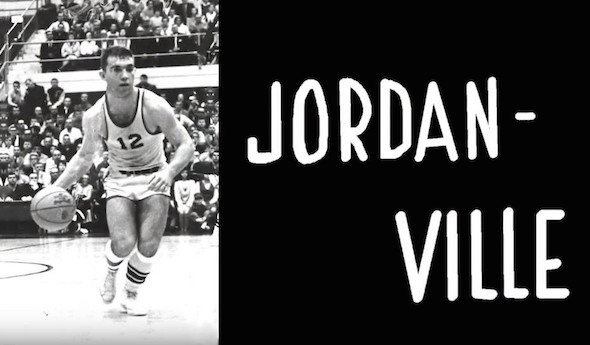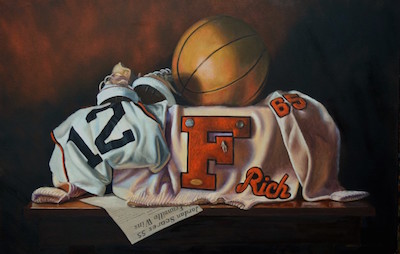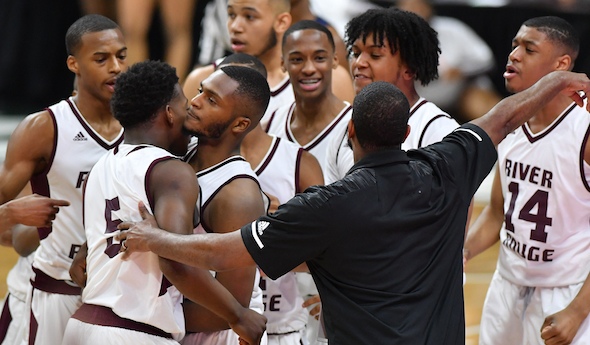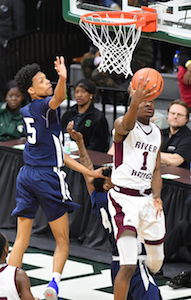
Film Fills In Picture of 'Fennville Flash'
By
Ron Pesch
MHSAA historian
December 28, 2017
We’ve been here before, but not in this way.
The last time was for a retrospective, covering one of the most impressive and awe-inspiring prep careers in Michigan high school history. That time was in print, and included a handful of still images that tried to illustrate the unbelievable.
But this time, the story is in documentary form. It’s woven together from grainy, scratched, faded silent film, a format of capturing memories familiar to thousands of people from generations past, as well as a series of modern-day high-resolution interviews.
Here, the basketball life of the athlete known as the “Fennville Flash” delivers on many levels. Yes, there is a Richie Jordan.
JordanVille, a documentary by John Mooy & Anne Colton, recalls a time when legend spread via word of mouth, newsprint and AM radio.
While it’s hard to comprehend for many today, the exploits of our athletic heroes were formed by “poets in the press box” who sat with pencil and paper, a typewriter, a microphone or a telephone, and described to their audience what they witnessed. On the receiving end, readers and listeners conjured up visualizations based on the facts, phrases and superlatives designed to create an image.
“Traveling left to right on your radio dial” helped listeners feel they were a member of the crowd, seated in the stands, in on the action and a witness to the mayhem. “Packed to the rafters,” reminded fans the importance of what was happening. An exciting game, presented by those with skill, created an event you longed to see. If a broadcast couldn’t be picked up on a transistor or tube radio, the final result might not be known, at the earliest, until the following day’s newspaper arrived.
I’ve told Jordan’s story via the MHSAA before; how he latched on to athletic training, weights and repetition to mold himself into a well-rounded athlete, able to leap to heights unexpected for a kid with a 5-foot-7 frame. The tales of his unfathomable accomplishments slowly leaked beyond the city limits of Fennville into Kalamazoo and greater Southwestern Michigan, then to Detroit. When Detroit Free Press writer Hal Schram relayed Jordan’s feats, the secret traveled across the state and beyond its drawn borders.
From there the legend of Jordan’s accomplishments grew. In Fennville, as in many small towns across the country, the city shut down when a game was played. The Jordan story was so enticing that thousands would travel vast distances to see him play with their own eyes. Today, his single season scoring average of 44.4 points per game during the 1964-65 campaign still remains the top mark in the MHSAA record book.
 JordanVille runs just shy of a half hour. Contained within is insight into the athlete that is challenging to relay in print form. Thanks to access to home movies and a series of interviews with Jordan, former teammates, past opponents and his high school coach, the determination, dedication and drive of a kid who wouldn’t let physical size be a deterrent from achievement radiates from the screen. On display is small town America at its finest, and perspective formed over 50+ years.
JordanVille runs just shy of a half hour. Contained within is insight into the athlete that is challenging to relay in print form. Thanks to access to home movies and a series of interviews with Jordan, former teammates, past opponents and his high school coach, the determination, dedication and drive of a kid who wouldn’t let physical size be a deterrent from achievement radiates from the screen. On display is small town America at its finest, and perspective formed over 50+ years.
For Mooy, it completes a filmmaking journey started six years ago. But the story of Jordan, in his eyes, date back to his school days. Mooy first heard about Jordan as a 7th-grader from a math teacher. A second-team all-St. Joseph Valley League selection, Mooy played at Marcellus High School and scrimmaged against Jordan and the Fennville Blackhawks.
He couldn’t believe his eyes.
“Everyone wanted to see this kid play,” said Mooy in 2011. “He was the first high school player I saw sign an autograph.
Today, with the interviews complete, and the film ready for viewing, Mooy sees more than just a sports story:
“With the benefit of years now passed, I look at the Rich Jordan story with a new respect. JordanVille created a place that was welcoming no matter who you were, or what color your skin happened to be. It was the 1960s. Rich was growing up Jewish, the Civil Rights Movement was in full swing, and the Vietnam War was on everyone's mind. And in Fennville, Michigan, from 1961 to 1965, the Jordan high school years, there were lessons beyond sports being learned by everyone that would last a lifetime. The Jordan household, under the guidance of (his parents) Tuffy and Sylvia Jordan, is where the story begins."
The film speaks of a time that has departed. Competition for our attention was less focused; phones hung on walls or sat on tabletops, communities were tighter, the training table featured peanut butter and chocolate milk instead of protein powder. A city could easily be renamed for a day.
The film also reminds us that those days were far from perfect.
If all goes as planned, the public will see the finished product come the flip of the calendar. In West Michigan, JordanVille is scheduled to show on New Year’s Day at 6 p.m. on WGVU, and will repeat on WGVU-Life at 7:30 p.m., Friday, Jan. 5.
Seek it out, and spread the word, just like in days of old.
 Ron Pesch has taken an active role in researching the history of MHSAA events since 1985 and began writing for MHSAA Finals programs in 1986, adding additional features and "flashbacks" in 1992. He inherited the title of MHSAA historian from the late Dick Kishpaugh following the 1993-94 school year, and resides in Muskegon. Contact him at [email protected] with ideas for historical articles.
Ron Pesch has taken an active role in researching the history of MHSAA events since 1985 and began writing for MHSAA Finals programs in 1986, adding additional features and "flashbacks" in 1992. He inherited the title of MHSAA historian from the late Dick Kishpaugh following the 1993-94 school year, and resides in Muskegon. Contact him at [email protected] with ideas for historical articles.
PHOTOS: (Top) Richie Jordan runs Fennville's offense during his thrilling high school career in the 1960s. (Middle) Jordan memorabilia, as captured by Bill Williams.

River Rouge Takes Title Dream Into Final
March 15, 2019
By Geoff Kimmerly
Second Half editor
EAST LANSING – At River Rouge, 14 MHSAA championship banners tell of one of the most storied programs in Michigan high school boys basketball history.
They don’t hang banners there for making the Semifinals or finishing runner-up.
That’s been on the minds of Panthers players all season after falling in the Semifinals the last two – and it was on their minds again as Friday’s Division 2 Semifinal against unbeaten Harper Woods Chandler Park went into overtime.
River Rouge saw a lead as large as 10 fade away during regulation, and then barely earned overtime on a last-second 3-pointer. But on the 20th anniversary of their last championship, the Panthers will get the opportunity to play for possibly the next after hanging on for a 72-66 victory at the Breslin Center.
“We need to win. I need to do whatever it takes to win the state championship. That’s what was going through my mind the whole time,” said River Rouge sophomore Legend Geeter of the game’s final stretch.
“I’ve been (to Breslin) once and lost in the Semifinals, and it was not a great feeling. In my mind, in order for this program to keep being great, we’ve got to win another state championship and put another banner up.”
River Rouge (23-2) will take on Hudsonville Unity Christian in Saturday’s 6:45 p.m. Final, in a rematch of the 1963 Class B championship game won by the Panthers 59-49.
Coach LaMonta Stone, who led the 1999 team, returned in November after two seasons away for his third tenure running the program and immediately told his players this season would be “state championship or bust” – but also that his expectation was that they would win title 15.
River Rouge has the most championships in the MHSAA’s 94-year history, but none during the 2000s, and the Panthers couldn’t bear the thought of another opportunity slipping away.
 The double-digit lead – 33-23 just less than a minute into the second half – did slip away gradually over the third and fourth quarters. Senior Josh Diggs gave Chandler Park a 58-56 lead with a 3-pointer with 49 seconds to go in regulation, and two free throws by senior Andre Bradford pushed the advantage to three with 13 seconds left. But senior Nigel Colvin saved River Rouge’s championship hopes, taking a pass down the baseline on the ensuing possession, moving two steps to his right and draining a 3-pointer with three seconds left on the clock.
The double-digit lead – 33-23 just less than a minute into the second half – did slip away gradually over the third and fourth quarters. Senior Josh Diggs gave Chandler Park a 58-56 lead with a 3-pointer with 49 seconds to go in regulation, and two free throws by senior Andre Bradford pushed the advantage to three with 13 seconds left. But senior Nigel Colvin saved River Rouge’s championship hopes, taking a pass down the baseline on the ensuing possession, moving two steps to his right and draining a 3-pointer with three seconds left on the clock.
“Nigel when I came into this team was just a spot-up shooter,” Stone said. “But he’s the hardest-working kid on the team. Every day before practice, after practice, he’s working on his 1-2 dribble pull-up. He doesn’t want to be known as just a 3-point shooter.
“So when I saw that shot, and he had to get it off, I’m just thinking back to when he’s in the gym after practice, before practice, working on those type of shots where he has to take one or two dribbles and shoot the ball. Two or three months (ago), he couldn’t have made that play – because he was just a spot-up shooter.”
Colvin hit another 3-pointer to open the overtime scoring, and Chandler Park senior forward Tyland Tate answered to tie things back up. But a Geeter basket with 1:50 to play gave the Panthers the lead back for good, as they finished on a 7-3 run.
The loss was the first and only this season for Chandler Park (21-1), which won its first Regional title last week on the way to this first trip to the Semifinals.
“You saw the support we had. A lot of people came out,” Chandler Park coach James Scott said. “Small charter school, on the end of the east side, Harper Woods area. So I thought it was big to show that we have talent, we’ve got some players and it’s a program on the rise. From making this type of run, every year, moving forward.”
Bradford had 14 points and three steals, and senior guard Derrick Bryant Jr. had team highs of 15 points and six assists for Chandler Park.
Colvin finished with 20 points to lead River Rouge, making 8-of-10 shots from the floor including 4-of-6 from 3-point range. Geeter added 17 points and six rebounds and senior Donavan Freeman scored 12. Senior Bralin Toney had seven assists.
PHOTOS: (Top) River Rouge players embrace senior Nigel Colvin after his game-tying 3-pointer during the final seconds of regulation Friday. (Middle) Donavan Freeman (1) gets a shot up just out of the reach of Chandler Park’s Tyland Tate.

